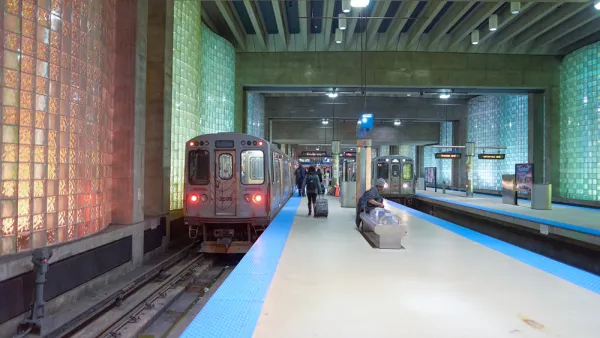Today, Mayor Rahm Emanuel will sketch out a fuller picture of the ambitious $7 billion public-private plan to upgrade Chicago's transit, schools, and parks, reports John Schwartz.
In a speech to be delivered today at the Chicagoland Laborers' Training and Apprentice Center, which The New York Times received an advanced copy of, Emanuel will outline the financing for the plan to expand the city's largest airport and improve its streets, water system, schools, community colleges, parks and commuter rail network.
The "audacious" plan represents a movement by states and cities across the country to take it upon themselves, often with public-private partnerships, to upgrade aging infrastructure without waiting for financing from a gridlocked federal government, notes Schwartz.
According to Robert Puentes, director of the metropolitan infrastructure initiative at the Brookings Institution, "There is tremendous interest in doing something different - people aren't waiting for the federal government to raise the gasoline tax or pass the carbon tax and have money raining down."
The plan will be partially funded by the newly created Chicago Infrastructure Trust, announced earlier this month. "Other funds will come from cost cutting, some from the savings in energy and water use from retrofitting buildings, and some from user fees, but 'none of these funds will come from an increase in property or sales taxes,' according to the speech."
While Chicago's history of corruption causes natural skepticism around major public initiatives, locals seem willing to give Emanuel the benefit of the doubt, at this point.
"'It's totally within reason for Chicagoans to be skeptical,' said Celeste Meiffren, field director for Illinois PIRG, an advocacy organization. 'That being said, it does seem that a lot of these projects are pretty worthwhile. If the mayor provides a lot of information to us as residents and taxpayers, gives us an opportunity to weigh in on these projects and involves our aldermen too - and makes sure we receive a fair value - it'll address a lot of the concerns we have here.'"
FULL STORY: $7 Billion Public-Private Plan in Chicago Aims to Fix Transit, Schools and Parks

Analysis: Cybertruck Fatality Rate Far Exceeds That of Ford Pinto
The Tesla Cybertruck was recalled seven times last year.

National Parks Layoffs Will Cause Communities to Lose Billions
Thousands of essential park workers were laid off this week, just before the busy spring break season.

Retro-silient?: America’s First “Eco-burb,” The Woodlands Turns 50
A master-planned community north of Houston offers lessons on green infrastructure and resilient design, but falls short of its founder’s lofty affordability and walkability goals.

Test News Post 1
This is a summary

Analysis: Cybertruck Fatality Rate Far Exceeds That of Ford Pinto
The Tesla Cybertruck was recalled seven times last year.

Test News Headline 46
Test for the image on the front page.
Urban Design for Planners 1: Software Tools
This six-course series explores essential urban design concepts using open source software and equips planners with the tools they need to participate fully in the urban design process.
Planning for Universal Design
Learn the tools for implementing Universal Design in planning regulations.
EMC Planning Group, Inc.
Planetizen
Planetizen
Mpact (formerly Rail~Volution)
Great Falls Development Authority, Inc.
HUDs Office of Policy Development and Research
NYU Wagner Graduate School of Public Service



























